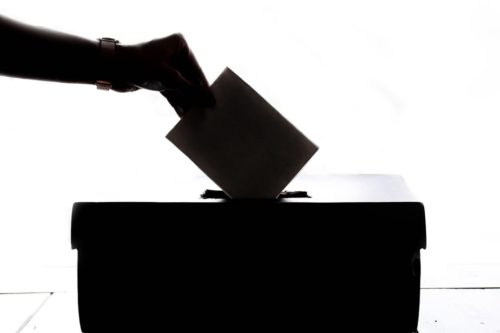
Photo provided courtesy of Unsplash.com
By Matthew Naum, Staff Writer
On January 17, 2020 the United States Supreme Court agreed to hear appeals from two cases concerning whether states have the authority to penalize “faithless electors”, the name for members of the Unites States Electoral College who choose not to support the candidate chosen by the voters of their state in presidential elections. [1] The two cases stem from state electors in Colorado and Washington who cast their ballots for other candidates in violation of state laws when the majority of voters in their states had voted for Hillary Clinton in the 2016 presidential election. [2] With a decision likely coming in June, these cases could mean a great deal for the forthcoming 2020 presidential election. [3]
Traditionally, each state political party picks electors prior to an election, and the electors of the party whose candidate wins the most votes in that state ultimately vote for the president. [4] While electors are not constitutionally bound to vote in line with the majority of voters in their state, 30 states currently have legislation meant to bind electors to this process, often through requiring them to vote for the candidate of the party that nominated the elector or requiring them to sign a pledge to do so. [5] Some states go further and impose criminal penalties such as fines, while others may disqualify an elector and replace them for violating their pledge. [6]
In the Washington case, the Washington Supreme Court upheld the imposition of $1,000 fines on four electors who cast their ballots for former Secretary of State Colin Powell and Keystone Pipeline activist Faith Spotted Eagle instead of Hillary Clinton, as was required by law. [7] In its opinion, the court held that “Article II, Section 1 of the United States Constitution grants to the states plenary power to direct the manner and mode of appointment of electors to the Electoral College” and that the state law imposing the fine fell within that authority. [8] Three of the electors then appealed to the US Supreme Court, arguing that electors are supposed to use independent judgement in casting ballots state fine infringes on their free speech rights and interferes with the federal electoral process. [9]
In the differently decided case from Colorado, one elector violated state law when he cast his vote for former Ohio Governor John Kasich instead of Hillary Clinton, and his vote was discarded and he was removed by the Colorado Secretary of State and replaced with an elector who voted for Clinton. [10] This elector, Michael Baca, brought suit against Colorado Department of State in the United States District Court for the District of Colorado alleging a deprivation of his rights, however that court granted a motion to dismiss brought by the Department of State. [11] The 10th Circuit Court of Appeals reversed the motion and held that Article II and the Twelfth Amendment of the Constitution allow for presidential electors to vote with discretion, and the Department of State acted unconstitutionally in removing Baca and nullifying his vote. [12] The 12th Amendment requires electors to cast a ballot for both President and Vice President. The Colorado Department of State appealed, arguing that the ruling impedes the state’s ability to enforce the law and may undermine voters across the nation. [13]
Twice in the past five elections the winner of the Electoral College and the presidency has lost the popular vote, George W. Bush in 2000 and Donald Trump in 2016. [14] [15] These results have in part been responsible for a renewed national interest in the Electoral College, with politicians like Sen. Elizabeth Warren and Rep. Alexandria Ocasio-Cortez advocating for eliminating the Electoral College in favor of a national popular vote, with Ocasio-Cortez going so far as to call the Electoral College a “scam”. [16] [17] While mainstream opposition to the Electoral College may have grown in recent years, it is not without defenders. Twenty-two state attorneys general signed an amicus brief in support of Colorado’s appeal to the Supreme Court arguing that the 10th Circuit’s ruling could disenfranchise states and diminish their voting power, especially for smaller population states like South Dakota with only three electoral votes. [18] Additionally, the attorneys general argue that the inability to replace electors could have dire consequences for an election, such as the 1876 and 2000 elections which were decided by a combined 6 electoral votes. [19] 2016 saw the highest number of faithless electors in US history, with 7 of 10 votes by faithless electors being counted for candidates other than their party’s nominee. [20] Current polling predicts the 2020 election to be another close election. [21]
Whatever the result of the Supreme Court’s decision, counsel for the faithless electors in Washington, Harvard professor Lawrence Lessig, argues that the decision should come quickly. [22] Lessig argues that the court should resolve the issue before the justices can know which candidates may benefit from their ruling. [23] In a time where over 50% of Americans believe the Supreme Court is mainly motivated by politics, these cases likely loom large for not only the 2020 election but the public image of the court itself. [24]
[1] https://thehill.com/regulation/court-battles/478839-supreme-court-agrees-to-hear-faithless-electors-cases
[2] https://www.cbsnews.com/news/supreme-court-to-hear-faithless-elector-case-involving-electoral-college-ahead-of-2020-election-2020-01-17/
[3] https://thehill.com/regulation/court-battles/478839-supreme-court-agrees-to-hear-faithless-electors-cases
[4] https://www.archives.gov/electoral-college/electors
[5] https://www.ncsl.org/research/elections-and-campaigns/the-electoral-college.aspx#faithless
[6] Id.
[7] https://www.seattletimes.com/seattle-news/politics/states-high-court-upholds-1000-fines-for-rogue-electors-who-didnt-vote-for-hillary-clinton-in-2016/
[8] Matter of Guerra, 441 P.3d 807 (Wash. 2019)
[9] https://www.seattletimes.com/seattle-news/politics/u-s-supreme-court-to-consider-washingtons-2016-faithless-electors-who-refused-to-vote-for-hillary-clinton/
[10] Baca v. Colorado Department of State, 935 F.3d 887, 901 (10th Cir. 2019)
[11] Id. at 901
[12] Id. at 956.
[13] https://denver.cbslocal.com/2020/01/17/colorado-faithless-electors-supreme-court/
[14] https://www.presidency.ucsb.edu/statistics/elections/2016
[15] https://www.presidency.ucsb.edu/statistics/elections/2000
[16] https://www.nytimes.com/2019/03/18/us/politics/elizabeth-warren-town-hall-electoral-college.html
[17] https://thehill.com/homenews/house/458122-ocasio-cortez-blasts-electoral-college-as-a-scam
[18] https://www.supremecourt.gov/DocketPDF/19/19-518/123119/20191120144150563_Baca%20-%20Brief.pdf
[19] Id.
[20] https://www.fairvote.org/faithless_electors
[21] https://www.realclearpolitics.com/epolls/latest_polls/general_election/
[22] https://www.nytimes.com/2019/10/14/us/politics/supreme-court-faithless-electors-2020.html
[23] Id.
[24] https://poll.qu.edu/national/release-detail?ReleaseID=2623